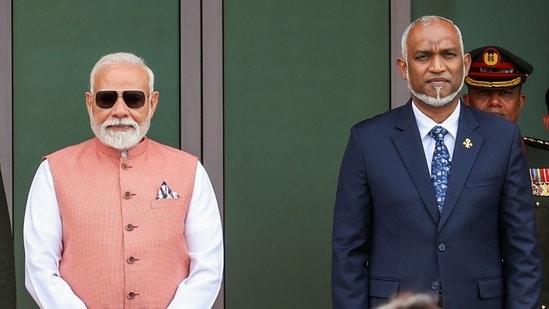In a move that could mark a critical shift in South Asian diplomacy, Prime Minister Narendra Modi met Maldives President Mohamed Muizzu on Friday, restarting what had turned into a rocky relationship. The two-day trip to the island nation is not just symbolic — it’s strategic, layered, and full of nuance. The meeting comes less than a year after Muizzu swept into office on an ‘India Out’ campaign platform.
Timeline of Events: From Strain to Reset
Back in 2023, Maldivian politics took a turn that rattled Indian foreign policy watchers. Muizzu, running a nationalist campaign, criticized India’s military presence in the Maldives and vowed to reset what he called “imbalanced ties”. The message seemed clear — India was no longer the favored partner.
Fast forward to today, the optics have changed. Modi’s latest visit, fresh off a significant stop in the UK, marks the first time a foreign leader has officially visited President Muizzu in Malé. That alone speaks volumes.
- Muizzu came to power in 2023 on an anti-India campaign
- Relations cooled as Maldives pivoted toward closer China ties
- India stuck to quiet, behind-the-scenes diplomacy
- Modi’s visit signals a turn in bilateral warmth
Diplomatic Thaw With Strategic Undertones
The key moment came during Modi’s landmark arrival early Friday. He was received with a full ceremonial welcome, something unusual after the previous sentiments expressed by President Muizzu’s camp. This time, the narrative is changing swiftly.
India is set to extend a $565 million line of credit to boost critical infrastructure in the Maldives, including public housing and energy projects. Negotiations are also kicking off on a potential Free Trade Agreement, something officials from both sides alluded to without confirming timelines.
Indian Foreign Secretary Vikram Misri summed up the relationship reset, saying:
“There will always be events that will impact or try to intrude on the relationship. But I think this is testimony to the kind of attention that has been paid to the relationship, and including attention at the highest levels.”
Official Statements Signal Cooperation
Perhaps the clearest sign of a diplomatic turn came not from words, but from action. Modi will virtually inaugurate the expansion of the Hanimadhoo International Airport, a project India is financing. The move underscores India’s continued economic engagement, regardless of political strain.
Also notable: Muizzu’s acknowledgment of India’s past support. He refrained from reigniting anti-India language during the joint press meeting, a far cry from his campaign days. A quiet nod, maybe, but one that didn’t go unnoticed.
Money Talks — And So Does Debt
The Maldives, with a $7.5 billion economy, found itself teetering on the edge of default months ago. India’s timely economic package prevented financial free fall, softening resistance in Malé. In contrast, China also remains a key lender and strategic partner. It’s a balancing act — perhaps even a risky one — but one that India is clearly committed to managing with long-term consistency.
Former Maldives foreign minister Abdulla Shahid added his voice to the evolving narrative, saying in comments to Reuters that Modi’s visit showed that Muizzu had:
“…decided to step back and correct the narrative.”
A Shift in Tone, But Not Necessarily in Ties
If you’re following regional politics, this visit is more layered than just economic support. It’s a quiet game of tug-of-war, with both China and India keen on keeping the Maldives in their strategic orbit. Things have softened — but soft isn’t always simple.
India’s MAHASAGAR vision — Mutual and Holistic Advancement for Security and Growth Across Regions — sees the Maldives as a central figure in its ‘Neighborhood First’ policy. That hasn’t changed. If anything, this latest move strengthens India’s maritime aims in the Indian Ocean.
Yet, Muizzu hasn’t abandoned relations with China. He continues to pursue financial and developmental guarantees on both ends. It’s like walking a diplomatic tightrope — and for now, he’s managed not to fall.
Saturday’s Symbolism: Independence Day Participation
Modi’s participation in the Maldives’ 60th anniversary of independence carries symbolic weight. The event, steeped in historic links to Britain, sees India visibly positioning itself beside a nation whose colonial freedom parallels South Asia’s own late 20th-century geopolitical reawakening. Modi showing up adds a layer of intent, even if unsaid.
Community Response: How Are Locals Reacting?
On social media, Maldivian public opinion seems to be shifting slightly. Though there’s still some lingering nationalist sentiment, many welcome India’s financial involvement — especially as economic troubles loom.
Public comments on local news pages highlight practical concerns over ideological stances. One comment read, “If India helps us build our homes and keep lights on, that matters more than slogans.” Simple, but telling.
It’s a pragmatic perspective dominating the conversation. Perhaps voters remember promises during election seasons — but jobs, fuel, and functioning airports speak louder when the election’s over.
Quiet Wins for Both Sides
This wasn’t a high-stakes, flashbulb-filled summit. No grand declarations. No dramatic reversals. But maybe, that’s the point. In international relations, the quiet moments often mean the most.
And so, India and Maldives might be writing the next chapter. Slowly. Carefully. With all eyes watching to see what comes next.
What’s Next?
The months ahead will be key. If the Free Trade Agreement talks gain real momentum, it would mark a firm shift toward closer economic alignment. Likewise, whether or not India further roots itself in islands such as Addu Atoll through military cooperation will hint at what the long game looks like.
And let’s not forget China. With both nations heavily funded by Chinese and Indian loans, decisions in Malé will likely involve some calibrated juggling. For now, the Maldives appears closer to New Delhi — but we’ve seen these tides turn before.
So, where are we? Somewhere between tension and trust. Somewhere near balance, but not quite. And that’s probably good enough — for now.

